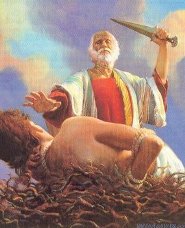In Bill Hybels’ book, Just Walk Across the Room, he challenges his readers to write out their faith story in 100 words or less. Here is my 105-word attempt:
Word of the Cross
Check out this simple discipleship tool to help people live consistently with the basic message of the gospel.
http://wp.me/P2bkGT-6K
Free Dumb
Everyone offers it. Few understand it. Many think they have it but know they do not. They talk of freedom but they are “free dumb.” Simply put, freedom is doing what you most want to do. Everything else is a degree of slavery. So, if I ask you, “What do you most want to do?” and you answer with anything other than what you are currently doing, then you are bound in some way. If you believe yourself to be free, then you are free dumb.
I have found that Jesus Christ alone offers true freedom. He has liberated me from regret, fear, and insecurity. He has pulled me into his loving embrace and I want nothing more. I want him like Paul did in Phil. 3:10-11. He is my great treasure and my aspiration. I have found limitless wonder, joy, and power as a willing subject in his perfect law-less reign. Sadly, those who reject him often do so because they believe he wants to hamper their “freedom.” They are free dumb.
Perhaps those who reject him think this way because of “believers” who are afraid to declare with Paul, “All things are lawful for me.” Such adherents speak judgment and rules as they drag the chains of their misguided responsibilities. All the while they are mute to the truth that sets us free. They are free dumb.
A Little Peace
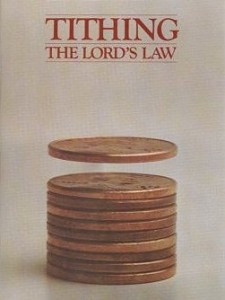
Why do Christian leaders tell people that they should tithe? I don’t have the definitive answer but I do believe that I know something true about tithing. Tithing is not for the generous but for the stingy. Generous people need only hear of the need and they will meet it. They do not need a minimum compulsory amount. Church leaders feel the need to teach on tithing because they are leading a group of selfish people. Take the selfishness one step further and tell the “givers” that God will return even more to them if they do tithe.
There was a time for tithing. God assumed selfishness in the unredeemed people of Israel and made provision for it. For those who have been implanted with the love of God, tithing has become obsolete. The saddest aspect of tithing teaching is when we presume selfishness from the redeemed, they begin to be selfish.
Here’s what Paul said about a general legalistic approach, which would include tithing.
The goal of this command is love, which comes from a pure heart and a good conscience and a sincere faith. Some have departed from these and have turned to meaningless talk. They want to be teachers of the law, but they do not know what they are talking about or what they so confidently affirm. We know that the law is good if one uses it properly. We also know that the law is made not for the righteous but for lawbreakers and rebels, the ungodly and sinful, the unholy and irreligious… (1 Timothy 1:5-9a)
My Two Masters Part Two
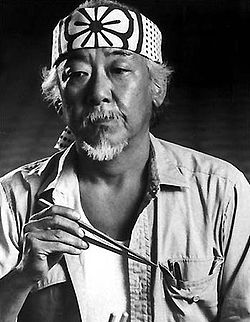
Daniel LaRusso’s first three days of “karate training” are filled with menial chores around Miyagi’s oasis in the junkyard. Each chore must be carried out according specific instructions, “Wax on, right hand; wax off, left hand. Make big da circles. Breathe in the nose, out through the mouth.” The next day, “Paint the fence.” The one after, “Sand the floor.” Each time, the method is specific. Posture, style, breathing- they all matter. The master’s unorthodox style confuses Daniel but he has agreed to do whatever he is told without question. That agreement comes to an end when by the afternoon of the third day, Miyagi checks on Daniel on his way to go fishing. Daniel unleashes a string of expletives in Miyagi’s direction and impugns his master’s motives. Miyagi interrupts Daniel with the stern command, “Daniel san, show me ‘sand the floor’.” The master begins to throw a series of punches and kicks at Daniel who watches himself block each one. Daniel stands stunned as Miyagi bows. Through unquestioning obedience to his master, Daniel has unknowingly received his imprint.
The figure I discovered in the pages of Matthew’s gospel compelled me to emulation. I fantasized about wearing a white robe and teaching under a tree somewhere. But that’s not what the Master told me to do. He put the sponge of forgiveness in my hand. The next day he gave me the brush of mercy. On day three I found myself stooping to sand off the sun-scorched outer layer of my greedy heart.
After training this way for years, I made the startling discovery that I had actually begun to care about other people like I care about myself. How did he do it? It could not have come through standing over people preaching to them even though that is the activity I saw my Lord engaging in. I, selfish and immature as I am, had to take the route of unquestioning obedience.
Here are the Master’s words about his method of training:
39 He also told them this parable: “Can the blind lead the blind? Will they not both fall into a pit? 40 The student is not above the teacher, but everyone who is fully trained will be like their teacher.
41 “Why do you look at the speck of sawdust in your brother’s eye and pay no attention to the plank in your own eye? 42 How can you say to your brother, ‘Brother, let me take the speck out of your eye,’ when you yourself fail to see the plank in your own eye? You hypocrite, first take the plank out of your eye, and then you will see clearly to remove the speck from your brother’s eye.
46 “Why do you call me, ‘Lord, Lord,’ and do not do what I say? 47 As for everyone who comes to me and hears my words and puts them into practice, I will show you what they are like. 48 They are like a man building a house, who dug down deep and laid the foundation on rock. When a flood came, the torrent struck that house but could not shake it, because it was well built.- Luke 6:39-42; 46-48 NIV
The question for Daniel and for all of us is not what am I accomplishing here but who am I becoming. When we receive the imprint of our Master, we will be ready for whatever gets thrown at us.
My Two Masters Part One
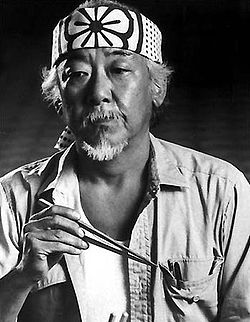 I’ll admit it: The movie, “Karate Kid” has to some degree defined me as a person. I’m not talking about the nepotistically-produced, pathetic excuse for a remake. I mean the gloriously cheesy, deliciously predictable original. I grew up without a father and really without a consistent father figure. As a modern individualist, my rational mind never allowed me to acknowledge my need for a mentor but the relationship between Daniel and Mr. Miyagi compelled my hungry heart. Ironically, the movie came out during one of the two summers I spent with my father. We are both fans of the martial arts. We went together. Sitting next to a man who had never been there watching a man who didn’t exist, I found a mentor.
I’ll admit it: The movie, “Karate Kid” has to some degree defined me as a person. I’m not talking about the nepotistically-produced, pathetic excuse for a remake. I mean the gloriously cheesy, deliciously predictable original. I grew up without a father and really without a consistent father figure. As a modern individualist, my rational mind never allowed me to acknowledge my need for a mentor but the relationship between Daniel and Mr. Miyagi compelled my hungry heart. Ironically, the movie came out during one of the two summers I spent with my father. We are both fans of the martial arts. We went together. Sitting next to a man who had never been there watching a man who didn’t exist, I found a mentor.
I got into Tae Kwon Do. Martial arts helped me in many ways. However I hung up my dobok three years later when I discovered a greater mentor – Jesus. After twenty five years of training under the Master, I’m still blown away by all he has to teach. Looking back, I’m surprised to discover that Jesus and Mr. Miyagi teach similar lessons and employ similar methods. Over the next few posts I’ll be sharing a few. The first is:
“Avoid the middle of the road.”
On the day of his first lesson, Mr. Miyagi asked Daniel, “Are you ready?” Daniel responded, “I guess so.” The master seized this teachable moment by explaining that a man who walks on either side of a road is safe while the one who walks in the middle will be “Squish! Just like grape.” Mr. Miyagi admonished that a person who makes up his mind either way regarding karate will be safe while the person who takes the “guess so” approach to karate places himself in harm’s way.
Jesus also instructed people who offered him conditional commitment that they would be better off not following (Luke 14:25-33). In fact, half-hearted disciples make the Master want to barf (Rev. 3:14-18). From the standpoint of the progress of the gospel, an open opponent is preferable to a half-hearted adherent.
Jesus and Mr. Miyagi teach that those who would come under their tutelage must buy in or get out. The alternative is “squish.”
To be continued…
What kind of God is this?
Man of Sorrow {Guest Post}
Another amazing, Bible-inspired poem from Zane Gilley, which I trust will focus your thoughts on the gospel of Christ this Good Friday.
Man of Sorrow The Son of God was born on earth to die, To rule not over sinful world below. The Son of Man is lifted up on high. The zealots lusted Rome to occupy; But Jesus knew his blood would freely flow The Son of God was born on earth to die. Peter, James, and John, saw with weary eye Jesus speaking in clouds with face aglow. The Son of Man is lifted up on high. The masses followed, their king to glorify. Singing ‘Hosanna!’, yet they did not know The Son of God was born on earth to die. He suffered greatly giving no outcry. With bleeding twisted thorns on broken brow, The Son of Man is lifted up on high. He sacrificed, our sins to purify. He spilt his blood and did to heaven go. The Son of God was born on earth to die. The Son of Man is lifted up on high.Out of the way and into The Way
 God seems to talk to me while I’m in the shower. That’s probably too much information but it’s true and the detail is important to my story. Today, he reminded me that living for him is something which he does. Walking in The Way means getting out of the way and letting the Son of God walk the earth in our shoes. The watershed moment in my life occurred when Colossians 1:27 dawned on my consciousness. Here is the NIV rendition of that verse: “To them (beings on the spiritual plane) God has chosen to make known among the Gentiles the glorious riches of this mystery, which is Christ in you, the hope of glory.” The message resident in that verse forever shifted my perspective and expectations. This morning, God reminded me of it.
God seems to talk to me while I’m in the shower. That’s probably too much information but it’s true and the detail is important to my story. Today, he reminded me that living for him is something which he does. Walking in The Way means getting out of the way and letting the Son of God walk the earth in our shoes. The watershed moment in my life occurred when Colossians 1:27 dawned on my consciousness. Here is the NIV rendition of that verse: “To them (beings on the spiritual plane) God has chosen to make known among the Gentiles the glorious riches of this mystery, which is Christ in you, the hope of glory.” The message resident in that verse forever shifted my perspective and expectations. This morning, God reminded me of it.
When I got to the office today, I realized that I had not changed over my superfluous desktop calendar. After ripping off last week at the perforation and placing it back on my desk, I looked and read the verse at the bottom: “Christ in you, the hope of glory.”
Be blessed today. God through his grace has not only taken your past in hand, he also will handle your present and your future. Praise him!
You Can Keep It
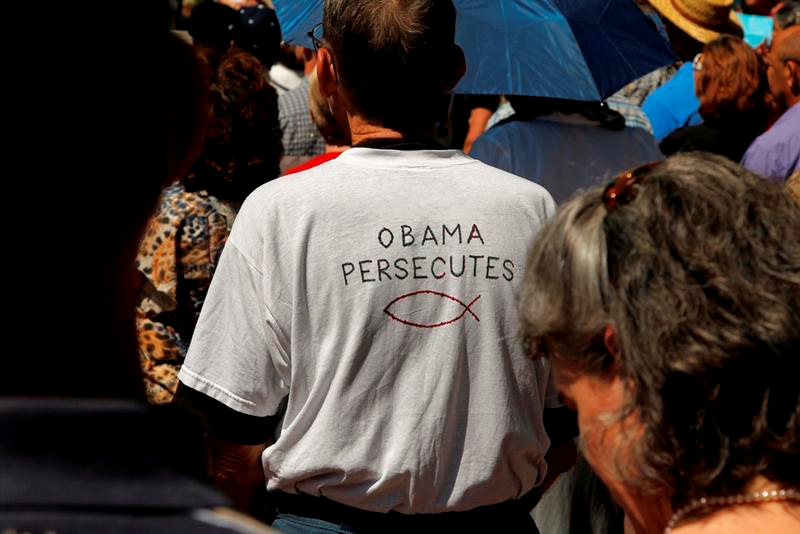 In the wake of various rallies which have taken place over the weekend regarding religion and the free exercise thereof, a question springs to my mind: “Who Would Jesus Protest?” Before you throw that question out as irrelevant, remember that Jesus lived and ministered in a highly-charged political environment. Jesus interacted with several political entities especially at the end of his life. Consider the following reading from the Gospel of John:
In the wake of various rallies which have taken place over the weekend regarding religion and the free exercise thereof, a question springs to my mind: “Who Would Jesus Protest?” Before you throw that question out as irrelevant, remember that Jesus lived and ministered in a highly-charged political environment. Jesus interacted with several political entities especially at the end of his life. Consider the following reading from the Gospel of John:
Then the Jewish leaders took Jesus from Caiaphas to the palace of the Roman governor. By now it was early morning, and to avoid ceremonial uncleanness they did not enter the palace, because they wanted to be able to eat the Passover. So Pilate came out to them and asked, “What charges are you bringing against this man?”
“If he were not a criminal,” they replied, “we would not have handed him over to you.”
Pilate said, “Take him yourselves and judge him by your own law.”
“But we have no right to execute anyone,” they objected. This took place to fulfill what Jesus had said about the kind of death he was going to die.
Pilate then went back inside the palace, summoned Jesus and asked him, “Are you the king of the Jews?”
“Is that your own idea,” Jesus asked, “or did others talk to you about me?”
“Am I a Jew?” Pilate replied. “Your own people and chief priests handed you over to me. What is it you have done?”
Jesus said, “My kingdom is not of this world. If it were, my servants would fight to prevent my arrest by the Jewish leaders. But now my kingdom is from another place.”
“You are a king, then!” said Pilate.
Jesus answered, “You say that I am a king. In fact, the reason I was born and came into the world is to testify to the truth. Everyone on the side of truth listens to me.” (John 28:28-37 NIV)
This discussion involves three parties. Two of them believe in Yahweh – the “Jewish leaders” and Jesus. Two of them struggle over political influence – the “Jewish leaders” and Pilate. Just one both worshipped Yahweh and bowed out of the political wrangling, even though the outcome had bearing on his very survival. His reason: “My kingdom is not of this world. If it were, my servants would fight to prevent my arrest by the Jewish leaders. But now my kingdom is from another place.”
What if those who today claim to serve Jesus Christ stood up and said, “You can keep it! We don’t need your support and we don’t fear your opposition. We will neither compromise our values nor fight over them. You are free to take away our rights, our dignity, our livelihood, and our very lives. You can keep it all because our kingdom is not of this world. In the end we will be vindicated and victorious. Just wait and see.”

